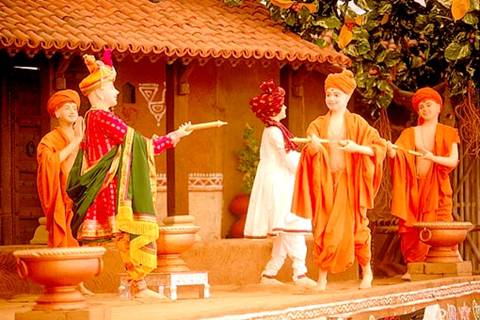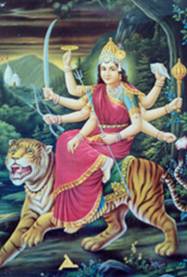 |
||
|
|
|
||||||||||
|
||||||||||
|
bitsaa.org BITS Pilani |
General Interest
“So,
where are you from?” I mull over this question as I stir the
gajar ka halwa while it cooks and as the amti boils.
My sister-in-law advises that for
best results amti must be allowed to boil for a good length of
time. Normally I am not so patient but today I allow that to
happen, to buy some time as I ponder how to reply if our guests
ask that question posed almost inevitably by new acquaintances to
each other - “So, where are you from?” But the problem is that
in the twenty years since I left my parental home to find my own
place in the world, I haven’t found a succinct answer to this
question though it has been asked of me on many occasions. I have often wanted to say in
response (and I think I actually did, once or twice) “Oh, from
all over the place”. But that can seem frivolous even though it
comes closest to the truth. My father, who cared very little for
this line of enquiry, used to say, “Tell them we are refugees
from How to explain lives like ours?
My parents were born in what is now the In the process, we never
experienced what is known as “Punjabiyat” nor did we come to
comprehend completely the Bengali or Bihari way of life though
those are the cultures that perhaps we have observed most closely
(no one in my family was surprised when my brother married a
Bengali and now he calls himself one). My husband’s story is no less
complicated than mine. His mother was a Maharashtrian Brahmin
while his father comes of a family of Telegu-speaking Brahmins who
moved to
Yet an acceptance of each
other’s culinary traditions doesn’t help us find an easy
answer to the question most Indians we meet for the first time ask
us about ten minutes into the conversation – “So, where are
you from?” Like the time my husband and I
were in a local store that stocks Indian spices. As we browsed, we
noticed another Indian and we all stopped to introduce ourselves.
We had barely gone past the stage of exchanging first names when
he popped this question at us. I remember thinking to myself
“Oh no, here we go again”. I knew that my husband’s
answer-“Well, that’s a tough one for us…” he began- would
fail to put us in a comprehensible slot because we are the kind of
people who are from everywhere and yet from nowhere. But how do
you sum up the nomadic past I have described into an answer that
can be delivered in one sentence in a shop aisle? Quite
predictably, we never heard from this person again. There are other issues that such
muddled histories as ours raise, which are not easily resolved
simply by acquiring a taste for new foods. For instance, I was
raised as an Aryasamaji and am still a staunch advocate of that
way of life. Yet I also have a deep love of Maa Durga and all that
she stands for, while my husband’s family have their own set of
divinities they put their faith in. Is it possible, I wonder, to
find in all this a coherent belief system and traditions to pass
on to the next generation? These are not questions that
bother me in a serious way though. I have never missed having a
strong ethnic identity, nor the traditions that go with such an
identity. For I have noticed that good people everywhere in the
world seem to live their lives by the same human values. This
makes them- whether they are Kannadiga, Czech, or Japanese-
honest, kind, considerate, polite and hospitable. So as my
daughter grows up, if these values are the only tradition I teach,
I think we will be okay. As for tonight, hopefully the
food will represent the amalgamation my husband and I are trying
to achieve in our lives because this amalgamation is our identity
now. The amti and the khamang kakdi reflect my husband’s
Maharashtrian antecedents while the matar paneer and the dessert
represent my Punjabi background. Imagine my surprise then that our
guests expressed no curiosity in our ethnicity in all the hours we
spent together. Anil and I were delighted to discover that we went
to the same school (though several years apart) in The reason for the lack of an
inquisition about our roots became clearer over the course of the
evening. Anil, as I gathered from the conversation, is probably a
native of Uttar Pradesh who grew up in May their tribe increase. ■
|
(c) Copyright 2003 BITSAA International Inc.


 I
am cooking for tonight’s dinner at which we are to be joined by
guests, an Indian couple I met at Charles de Gaulle airport in
I
am cooking for tonight’s dinner at which we are to be joined by
guests, an Indian couple I met at Charles de Gaulle airport in  Exposed
to so many diverse influences over the years, the original
traditions of our respective families have been somewhat
transformed and diluted. One benefit of this familiarity with
change has been that it has made the task of adapting to each
other’s ways easier in our marriage. Especially in the matter of
food, my husband’s Punjabification is complete. He loves nothing
better than gobhi ke paranthe any day of the week. As for me, I
enjoy nothing as much as I do the varan with rice and toop that he
grew up on. (Maybe I should confess here that this isn’t the
whole truth. It really pains my husband that I refuse to concede
the supposed superiority of the Alphonso mango. But though it is
beloved to Maharashtrians, it is often unknown to Biharis like me
who grew up on such delicious varieties of the fruit as the
Dusseri, the Langra and the Sindoori.)
Exposed
to so many diverse influences over the years, the original
traditions of our respective families have been somewhat
transformed and diluted. One benefit of this familiarity with
change has been that it has made the task of adapting to each
other’s ways easier in our marriage. Especially in the matter of
food, my husband’s Punjabification is complete. He loves nothing
better than gobhi ke paranthe any day of the week. As for me, I
enjoy nothing as much as I do the varan with rice and toop that he
grew up on. (Maybe I should confess here that this isn’t the
whole truth. It really pains my husband that I refuse to concede
the supposed superiority of the Alphonso mango. But though it is
beloved to Maharashtrians, it is often unknown to Biharis like me
who grew up on such delicious varieties of the fruit as the
Dusseri, the Langra and the Sindoori.)